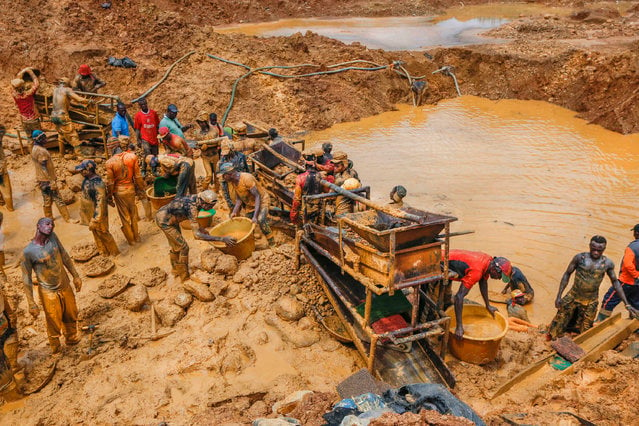“We have a duty to protect our lands and water bodies for future generations. Galamsey is a threat to our very existence.” Otumfuo Osei Tutu II
In Ghana, illegal mining is often called ‘galamsey,’ and it is a major problem for both the environment and local communities. This activity leads to serious issues such as cutting down forests, polluting water sources, damaging the land, and taking away jobs and income from the people who live nearby. The government is working to stop illegal mining, but there is still a lot of discussion about the role of traditional leaders. Are these leaders still the protectors of the land as they were in the past, or are they now part of the problem, contributing to the destruction of Ghana’s natural resources?
Traditional leaders, such as chiefs and clan heads, have long been important in managing land and natural resources in their communities. Their authority comes from customary law, which gives them control over land use and resource management. They often make key decisions to ensure land is used wisely and helps sustain their people’s livelihoods. In the past, before illegal mining became widespread, these leaders maintained ecological balance by following traditional environmental protection practices. They stopped farming near riverbanks, kept certain activities out of sacred areas, and enforced seasonal rules for hunting and fishing. These customs helped protect different species and ensured that natural resources remained available for the future.
Galamsey, or illegal mining, has gained popularity because many people are struggling economically and are drawn to the fast money it can bring. This scenario has created challenges for traditional leaders. Some chiefs are actively fighting against illegal mining, trying to protect their communities and the environment. On the other hand, some chiefs are accused of supporting galamsey, whether intentionally or unintentionally. This complex situation affects traditional leadership in various ways, as they balance economic pressures and their responsibilities to their people. Exploring these impacts can help us understand the delicate position traditional leaders find themselves in today.
Many traditional leaders are fighting against galamsey because it is harmful to their communities. These leaders join forces with the government, community groups, and security forces to stop illegal mining. They make sure everyone follows community rules, inform people about the dangers of galamsey, and support other ways to earn a living, like farming and eco-tourism. Chiefs like the Asantehene, Otumfuo Osei Tutu II, and the Okyehene, Osagyefuo Amoatia Ofori Panin, have spoken out against galamsey. They are strong advocates for taking care of the environment in ways that can last for the future.
On the other hand, some traditional leaders have been involved in supporting galamsey activities. Reports indicate that some chiefs rent out land to illegal miners in return for financial gain. These leaders often justify their actions by pointing to economic needs, claiming that mining can provide funds for community projects. However, while these actions might bring quick financial benefits, they often result in long-lasting damage to the environment and lead to social and economic issues.
Galamsey operators often have backing from powerful political and business groups, making it difficult for traditional leaders to oppose them. Chiefs who stand against illegal mining might face threats or pressure, and they could even be removed from their roles. When the government does not strongly enforce mining laws, illegal mining keeps spreading. This weak enforcement limits the power of traditional leaders to fight this issue effectively.
The way forward is to strengthen traditional leaders in environmental governance. For traditional leaders to protect the land effectively, several important actions need to be taken including the strengthening of legal support for traditional leaders. Government rules should recognize and support the important role of traditional leaders in caring for the environment. It’s crucial that laws are in place to give chiefs the power to control land use and punish illegal mining. By supporting alternative ways to earn a living, chiefs should collaborate with others to promote activities like farming, fish farming, and eco-tourism. These activities can provide young people with different job opportunities, reducing the need to turn to illegal mining. Traditional leaders should continue to educate their communities about the long-term risks of illegal mining and the advantages of protecting the environment. Finally, chiefs should work closely with government agencies, environmental groups, and development organisations to apply sustainable methods for managing land effectively.
In conclusion, traditional leaders in Ghana are at a crucial point in the fight against galamsey, which refers to illegal mining activities. While some leaders are dedicated to protecting the environment, others have been swayed by financial gains. The future of Ghana’s natural resources relies on strengthening the role of traditional leaders. Chiefs must collaborate closely with government authorities to find and promote sustainable alternatives to illegal mining practices. As Ghana continues its battle against galamsey, traditional leaders must rise to the challenge by acting not as enablers of destruction but as true guardians of the land.
“When traditional leaders turn a blind eye or take part in illegal mining, they betray their people and mortgage the future of their communities.” Anonymous
[email protected]


